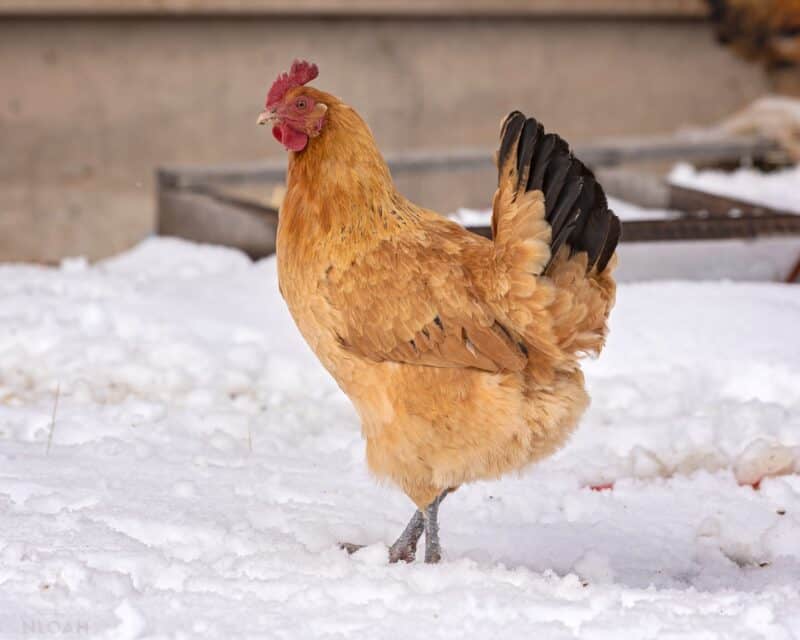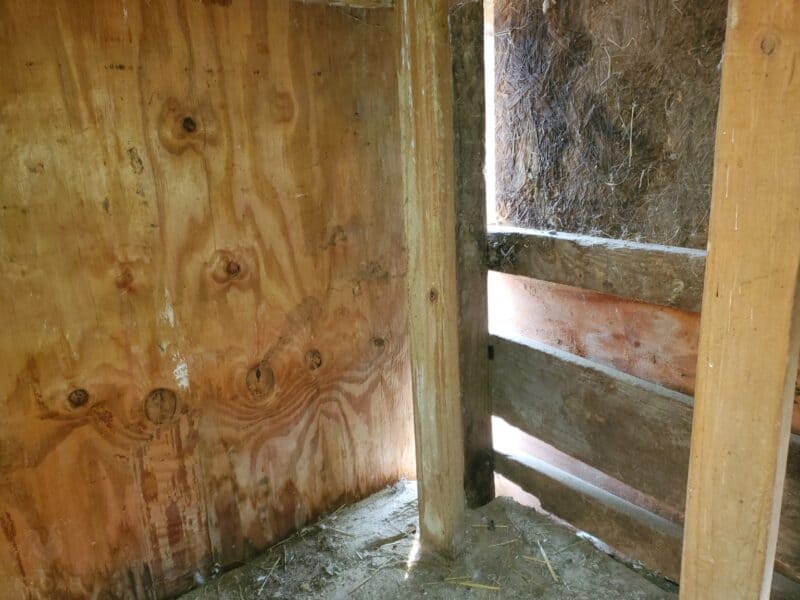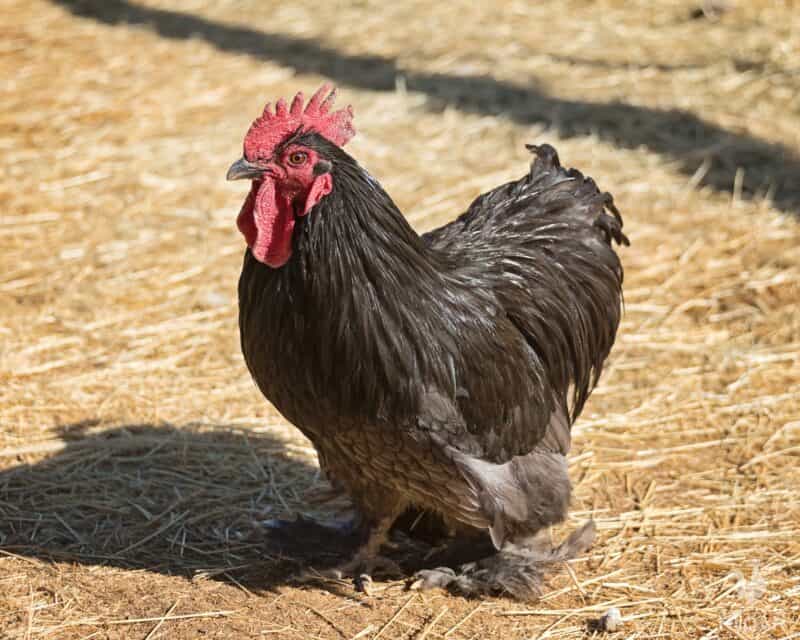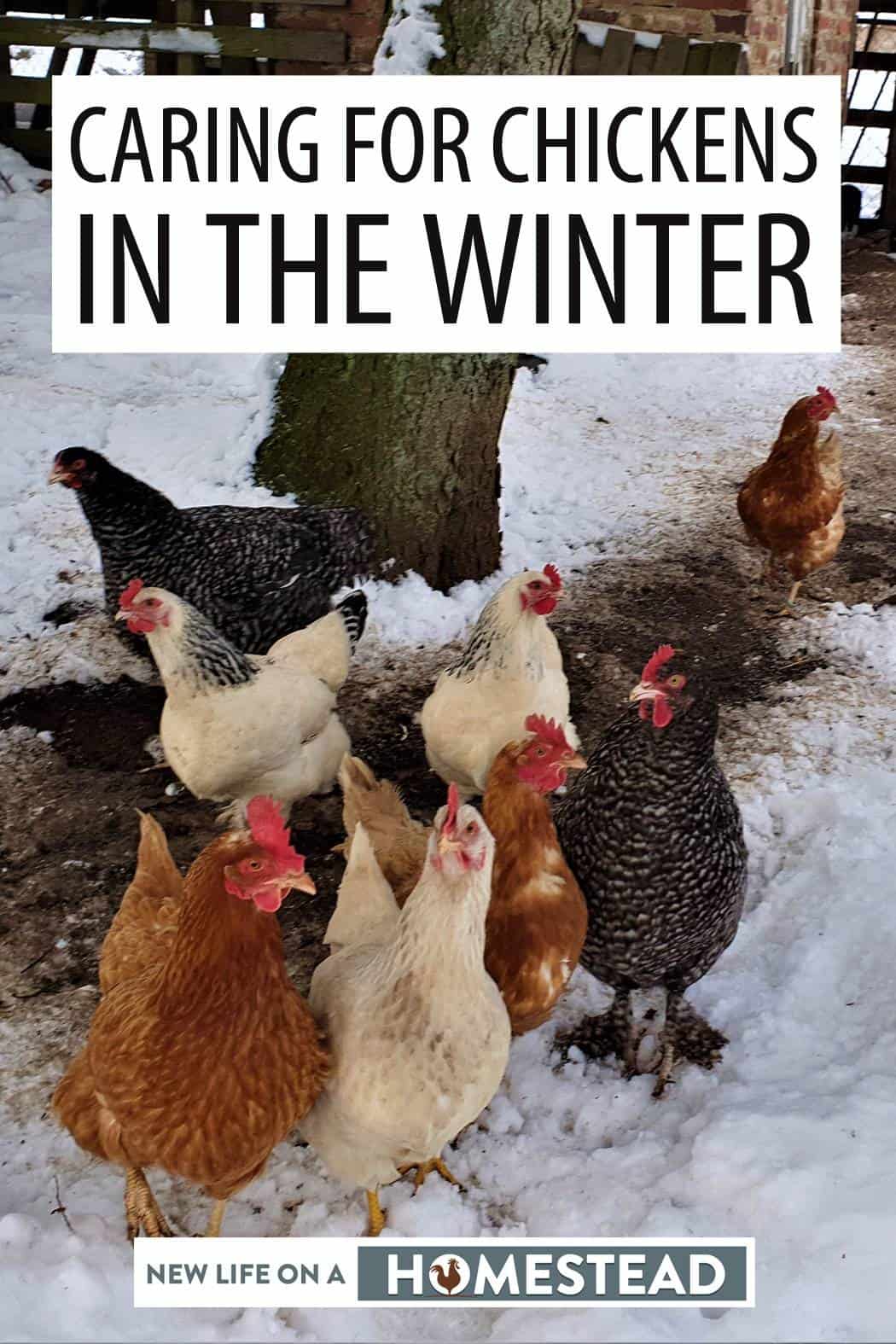Are you curious about whether caring for chickens in the winter is possible? This article will tell you everything you need to know.
The good news is that it is more than possible to take care of chickens during the colder months of the year. Not only is it possible, but it’s probably not as difficult as you might think, either.

This has been our first winter as chicken owners. I have to admit, I was pretty worried about how the chickens would hold out through the cold months. I have been very surprised at how hardy these little guys are though!
That said, you will need to take some steps to make sure your chickens stay comfortable and healthy during colder weather. Here’s what you need to know about caring for chickens in the winter!
How Cold is Too Cold for Chickens?
Chickens are a lot tougher than we give them credit for! They are incredibly hardy and can tolerate temperatures that are well below freezing.
As long as your chickens have shelter, they can handle cold weather just as well as (if not better than) you can. The key here is making sure they have a place to go during inclement weather and following all the tips for caring for chickens in the winter that I will detail below.
Chickens can handle cold weather but ultimately prefer temperatures to be warmer – about 70 degrees is the sweet spot for most birds.
Can Chickens Stay Outside in the Winter?
Yes, chickens can stay outside in the winter – although I wouldn’t recommend keeping them exclusively outdoors all day. You should provide some sort of shelter, especially for the nighttime hours when the temperatures drop really low and predators remain a concern.
Chickens benefit from being outdoors in the winter, especially if you are raising one of the more cold-hardy breeds. They can regulate their body temperature with their undercoat of feathers.
Plus, they will increase their food intake during colder temperatures.
Caring for Chickens in the Winter: 20 Tips
The first time you raise chickens in the winter might be a little harrowing – but don’t worry, after a few years of raising chickens in the winter, you’ll realize that doing so is no different than raising chickens in any other season!
Here are some tips.
Follow Their Lead
One of the best tips to follow when it comes to raising chickens in the winter is simply to let them call the shots.
You might feel tempted to force or shoot your birds inside as soon as the weather sours. However, chickens aren’t as averse to poor weather as you might assume. Don’t’ waste time trying to usher them in when it starts snowing – if they’re still comfortable and would rather hang outside, let them do so!
Install Roosts
If you haven’t already make sure your roots are adequate. Roosts should be at least two to three feet above the ground to help reduce the amount of cold that works its way up to a chicken uncovered feet.
Also, make sure that you have plenty of space for your birds to roost – but not too much, since they’ll huddle up for warmth.
Feed Cracked Corn at Night
Feeding cracked corn or other warming treats, like oatmeal, is a great way to keep your chickens warm when the mercury dips during the evening. Feed a few treats right before bed – after your chickens have already eaten their fill of their actual food – and your chickens will go to bed with full, happy bellies.
Just don’t overdo it with treats like oatmeal. Oats contain certain fibers that are difficult for chickens to digest. They might not be able to absorb nutrients from other foods as readily.
Watch for Frozen Waterers – and Feeders
Consider getting some heated waterers for your flock. These will reduce or eliminate the likelihood of water freezing or getting too cold. Chickens won’t be as inclined to drink ice cold water so warming it up a bit can help entice them to stay hydrated.
Contrary to popular belief, chickens need just as much water in the winter as they do in the summer – so make sure they are well-provided for!
Don’t Expect a Lot of Eggs
There are some chickens who will continue to lay well right through the winter months.
Don’t expect it, though. Some breeds will stop laying completely until the days get a little longer.
While you can encourage them to continue laying by putting a light in the chicken coop, supplementing light can stress the birds and ultimately shorten their laying lifespan.
Install Some Play Toys
On those cold, dark days of winter, it’s easy for chickens to get bored. Boredom is something you should avoid at all costs in the chicken coop, since it can lead to problem behaviors like feather pulling and pecking.
To prevent this, consider installing some toys in the coop, especially if you plan on leaving your chickens locked up all day. You might want to hang a head of cabbage on a string or install a few perches or swings. This will keep your birds entertained for sure!
You Don’t Need a Heater
A common misconception about raising chickens in the winter is that they need a heater to stay warm. That’s not the case.
Not only is a chicken coop heater dangerous – with all that bedding, you are dramatically increasing the likelihood of a fire – but it’s unnecessary. Chickens huddled together for warmth for night and a heater will only make things too warm.
Plus, if there is a power outage, then having a heater could do more harm than good. Just think about it – your chickens will be used to a nice, warm coop – and then it will suddenly get very, very cold. This fluctuation in temperatures is often more dangerous to a chicken than the cold.
The same goes for heat lamps – these are not necessary and will make it more difficult for a chicken to survive without supplemental heat. Not to mention the fire hazard!
Collect Eggs Often
If you are raising laying chickens, check the nesting boxes several times throughout the day. The last thing you are going to want to deal with when it gets colder are eggs that are frozen and blow up all over the coop.
Try the Deep Litter Method
If you hate cleaning the chicken coop bedding in the middle of the winter, you aren’t alone. There’s nothing quite so unpleasant as scraping frozen bedding off the bottom of the floor!
Rejoice -because this is a solution to keeping chickens warm in the winter that will also eliminate the need to clean the coop constantly.
The deep litter method is a style of chicken coop management that will allow chicken manure and bedding material to build up in the coop over the year. Ideally, once winter sets in, you’ll have about a foot of heavily composting material on the floor of the coop.
And if you’re familiar with composting, you know that a cooking compost is a hot compost – and the bedding will actually work in and of itself to heat the coop. Plus, you won’t have to worry about cleaning out the coop weekly – just add more bedding every week until you’re ready to clean.
Make a DIY Chicken Sunroom
There are very few chicken owners who want to keep their chickens locked in the coop all winter long. However, when it gets really cold outside, your chickens might be reluctant to step foot outside of the nice, toasty building.
You can entice them out by building a greenhouse-style addition to your coop. Cover this addition in clear plastic and it will give your chickens a warm and dry place to hang out on bad winter days.
Shovel the Snow
Chickens aren’t overly fond of snow, especially when the weather is very cold. You can scatter some straw on the ground over the snow to give your chickens a place to walk but in many cases, it might be easiest just to shovel them a path.
As soon as temperatures rise a little bit, into the low 30s, they won’t mind walking on the cold snow as long as it’s not too high.
Allow for Exploration
You might feel inclined to let your chickens stay locked in the coop all day but try to avoid this temptation. Chickens can handle the cold and the snow so let them out!
Chickens actually have very little muscle in the bottom portions of their feet and legs. Because of this, the blood stays warmer. Getting your chickens to move around throughout the day will allow for the little bit of blood flow that they need.
Keep Things Dry
A word of caution – if you also raise ducks, don’t keep them in the coop with your chickens, especially not during the winter. You need to make sure the coop is dry. Add more bedding than you might during other seasons so your chickens don’t stay wet.
Try Petroleum Jelly for Frostbite
This isn’t necessary except in the most extreme of temperatures but you may want to consider putting a dab of Vaseline on the combs and wattles of your chickens.
As mentioned earlier, chickens with smaller combs tend to perform best in cold winter weather, but if you have chickens with larger combs, then you may find that frostbite becomes an issue.
Maximize Ventilation
You don’t want too many drafts in your coop (more on this below). However, it also shouldn’t be locked up, airtight. You need some ventilation to prevent ammonia buildup (not to mention the fact that a locked-up tight coop is going to stink to high heaven if there’s no airflow!).
Put some vents at the roof of the coop, where the cold air won’t blow directly onto your birds. The vents will allow the warm, moist air from your chickens’ breathing to escape while allowing in fresh, cool, and dry air THis will keep humidity down and prevent problems with frostbite and mold.

… But Minimize Drafts
Wind chill can dramatically increase the heat loss from your coop, so while it’s important for your coop to be well-ventilated, you need to do your best to minimize drafts. Make sure any air leaks are sealed up. If your coop is brand new, it shouldn’t be drafty, but after a few years, coops naturally develop rotten spots that need to be repaired.
Ensure Adequate Roosts
Chickens need to be able to roost at all times of the year but especially in the winter. Make sure your chickens can roost together and fluff their feathers over their feet to stay warm and dry.
Roosts should be at least two feet off the ground and wide enough (but not too wide so that your chickens can’t wrap their toes around them) for your chickens to rest securely.
Take Advantage of the Sun
Take advantage of natural sunlight to help your chickens stay warm. A well-insulated window can trap the sun, particularly if you have a dirt or dark-colored floor.
You can also add a floor made out of materials like stone or concrete, which will retain heat during the day and then release it overnight.
Insulate – But Not Too Much
Insulating the coop is important to keep it cool in the summer and warm in the winter – but don’t get too overzealous with this. Winterize the coop before cold weather sets in.
This can be done in several ways. One is to use fiberglass or foam insulation in the walls and then cover them with plywood so your chickens can’t peck at them.If that’s not an option, you can even hang thick horse blankets on the wall or stack bales of straw against the wall.
Remember, you want insulated – but not airtight. Ventilation is key!
Close Off Part of the Coop
If you find that one section of your oversized coop stays warmer than the other, you might want to close off the coop so there’s not as much coop that needs to stay warm. You can hang blankets to block off unused portions of the coop or even just put up temporary walls made out of straw bales.
Cold Tolerant Chicken Breeds
Most chicken breeds can handle winter weather relatively well, provided that they have access to a dry, clean area during particularly bad or wet weather.
However, there are some breeds that do better in cold climates than others. Those that have small combs tend to do the best, as the comb is most likely to succumb first to frostbite.
Similarly, large chicken breeds with heavy feathers do well in cold weather. The feathers, as you might expect, shelter the birds from extreme temperatures.

Some of the best breeds to consider raising if you live in a very cold climate include:
- Australorps
- Silkies
- Plymouth Rocks
- Dorkings
- New Hampshire Reds
- Rhode Island Reds
- Cochins
- Jersey Giants
Winterizing the Chicken Coop: What I Did
When the weather started getting chilly last Fall, and the leaves were gone from the trees, we knew it was time to winterize the chicken coops. My husband, genius scavenger that he is, got a hold of the plastic wrapping off of a huge water heater box in the garbage at his work, and brought it home for our project.
Gotta love the man!
The clear plastic is about 6 mil thick. We used clear so that the sun could shine through and heat the inside of the coop. Black plastic just deflects the light and doesn’t do a good job of keeping the chickens warm. We also put lots of straw in there with them. The bottom of the coop is wire, so air can still circulate well enough. This setup has worked well for us.
One night we didn’t get the chickens up before nightfall. If we don’t catch them in time, they will roost high up in the trees. I was worried about them ’cause the weather was gonna be below freezing that night.
I envisioned finding stiff chickens frozen to the tree limbs. The next morning I went outside to see how they’d done, and was really surprised to find them happily pecking around on the ground. They were fine!
Kinda reminds me that God created these animals to be able to survive without people pampering them all the time!
So, having chickens through the winter hasn’t really been a big deal. I still let them out to play during the daylight hours, and they don’t seem to mind the snow at all. The only thing you have to worry about is keeping their water from freezing. Everything else is business as usual!


A city girl learning to homestead on an acre of land in the country. Wife and homeschooling mother of four. Enjoying life, and everything that has to do with self sufficient living.

I agree with Alana…the down to earth blog has great ideas! Our chicken’s egg production decreases in the winter, too. We have a light on for them during the day since they don’t like to go out in the snow. They’re such a bunch of chickens. 😉
Kendra,
Sorry I’m so late on commenting. I just wanted to tell you about a blog I like to read: http://down—to—earth.blogspot.com/
It’s from Australia but it has good advice on homesteading. A couple days ago, she had a series on raising chickens that you might like to read.
I so enjoy reading your blog–esp. the antics of the pig and puppy.
We have both ducks and chickens, and I was concerned because our chickens lost a TON of feathers and were going to weather the winter ‘bare-bottomed’… but they’re just fine.
We have a shed (8×8 wooden off Craigslist) with a door/ramp on the side cut for them, and apple crates as nesting boxes (with straw in them). We do leave the light on in there all of the time for warmth, but they do fine. The ducks stay outside, the chickens stay within.
Not sure why you’re getting so few eggs, though. Breed, maybe? We average 2 ducks and 3 chicken eggs a day, and it’s February in Michigan. Yes, they pitter off in November/December when it’s so dark for so long, but we still get at least two eggs a day during that time.
anna-
We probably get less eggs because we don’t keep a light on. I’ve read that keeping a light on in the coop will encourage your chickens to lay more often.
I remember when we first got chickens we about went broke trying to keep the coop above freezing. We had heat lamps going day and night. Now we have a larger coop and lots more birds. Their bodies alone will keep the coop above freezing and they roost in the rafters where it is warmer. We have a heated waterer and with the ducks, they go through lots of water. Our temps get really low, but this year none of the chickens have lost any of their comb. We read up lots on this before getting them and the trick it to get a good thick (at least 6″) layer of bedding down. We used dried leaves and add straw about once a month. The composting of the inner layers of bedding actually produce heat. The birds love it when I come in and spread the straw. They spend the whole day scratching around and snuggled up. If it wasn’t so expensive, I’d probably add some every day. Through our sale of eggs we don’t have to pay for their feed anymore. We charge $2 / doz. and have regular customers now. The duck eggs are great large porcelain colored eggs and are not as “runny” as chicken eggs which makes them great for baking. I used 2 duck eggs in my wheat bread last weekend and it came out great! I have heard that the whites make wonderful marangue.. though we don’t eat that so haven’t tried it. My husband does not eat any sugar in anything. Do you sell your eggs? I’m so excited to see your email everyday. Someone I can really relate to even though we are in different parts of the country. I wish I had lots more time to blog.
God Bless,
Mrs. D
Mrs. D,
Great advice! We’d love to get some ducks in the future to go on our ponds. Still have to figure out how to keep the foxes from getting them though. My dad got several ducks a few years back, but within a week they were all gone. No, we don’t sell our eggs as we don’t get many yet. I’m dying to hatch chicks and increase our flock size so that we do have an abundance of eggs. I’d love to have a way of making money to buy the feed. We’ll get there eventually 🙂 So glad you enjoy my posts!! I love hearing your comments as well. It’s good to get feedback from people who are more experienced!
Chickens are such easy animals to care for. Another reason I love them so! I’ve also learned that if you keep the coop door open, when it’s their ‘bedtime’, they’ll walk into the coop and get on their roosts without you having to go get them and put them in the coop.
You would think that the cold weather would hinder egg production, but certain breeds are still good winter layers IF THEY HAVE SUNLIGHT. This is key to good winter layers. So the clear plastic serves to allow them to lay longer. (Exception: if they are molting).
Look how warm and cozy they look! Chickens really are amazingly tough! I got so tired of fighting frozen water that I finally broke down and bought a heater poultry waterer last winter. It’s a bit of a pain to work with, but it’s worth it!
I am so happy to read this post. We are preparing to get our first chickens here in a couple weeks. We are planning the coop and my biggest fear is next Winter. I have been so worried they will freeze without a heat lamp and lots of insulation. This post makes me feel SO MUCH better!
Do you use a heat lamp at all? Or just the extra straw in the coop.
Sara-
No heat lamp. Just straw, plastic wrap, and each other to keep warm!
do you get any eggs in the winter??
Tarena-
We don’t get many eggs in the winter, maybe 1-3 a week from 6 hens.